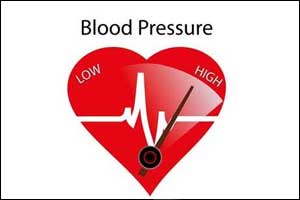- Home
- Editorial
- News
- Practice Guidelines
- Anesthesiology Guidelines
- Cancer Guidelines
- Cardiac Sciences Guidelines
- Critical Care Guidelines
- Dentistry Guidelines
- Dermatology Guidelines
- Diabetes and Endo Guidelines
- Diagnostics Guidelines
- ENT Guidelines
- Featured Practice Guidelines
- Gastroenterology Guidelines
- Geriatrics Guidelines
- Medicine Guidelines
- Nephrology Guidelines
- Neurosciences Guidelines
- Obs and Gynae Guidelines
- Ophthalmology Guidelines
- Orthopaedics Guidelines
- Paediatrics Guidelines
- Psychiatry Guidelines
- Pulmonology Guidelines
- Radiology Guidelines
- Surgery Guidelines
- Urology Guidelines
5 minutes of new Exercise regime may reduce blood pressure

New type of exercise regime that neither involves weight lifting or running can reduce blood pressure, risk of heart attack , cognitive decline and increase performance in sports is too good to be believed.Mind you time of exercise is just 5 minutes.
But it's true according to initial results from a clinical trial of Inspiratory Muscle Strength Training (IMST), pesented this week at the Experimental Biology conference in Orlando.
IMST involves breathing in vigorously through a hand-held device -- an inspiratory muscle trainer -- which provides resistance. Imagine sucking hard through a straw which sucks back.
"IMST is basically strength-training for the muscles you breathe in with," said Daniel Craighead, a postdoctoral researcher in the the University of Colorado Boulder Integrative Physiology department who is leading the study. "It's something you can do quickly in your home or office, without having to change your clothes, and so far it looks like it is very beneficial to lower blood pressure and possibly boost cognitive and physical performance."
During early use in patients with lung diseases, patients performed a 30-minute, low-resistance regimen daily to boost their lung capacity.
But in 2016, University of Arizona researchers published results from a trial to see if just 30 inhalations per day with greater resistance might help sufferers of obstructive sleep apnea, who tend to have weak breathing muscles.
In addition to more restful sleep, subjects showed an unexpected side effect after six weeks: Their systolic blood pressure plummeted by 12 millimeters of mercury. That's about twice as much of a decrease as aerobic exercise can yield and more than many medications deliver.
"That's when we got interested," said principal investigator Professor Doug Seals, director of CU Boulder's Integrative Physiology of Aging Laboratory.
With about half the tests done, the researchers have found significant drops in blood pressure and improvements in large-artery function among those who performed IMST with no changes in those who used a sham breathing device that delivered low-resistance.
The IMST group is also performing better on certain cognitive and memory tests.
When asked to exercise to exhaustion, they were also able to stay on the treadmill longer and keep their heart rate and oxygen consumption lower during exercise.
Some cyclists and runners have already begun to use commercially-available inspiratory muscle trainers to gain a competitive edge.
But Seals and Craighead stress that their findings are preliminary and curious individuals should ask their doctor before considering IMST.
That said, with a high compliance rate (fewer than 10 percent of study participants drop out) and no real side-effects, they're optimistic.
High blood pressure which is a major risk factor for cardiovascular disease, which is the number one cause of mortality world over can be certainly tackled with this new discovery.
blood pressureblood pressure symptomsBPCognitive declinedecreasesExercisefoods that lower blood pressureheart-attackhigh blood pressurehigh blood pressure diethigh blood pressure symptomshigh BPhow to lower blood pressure blood pressure rangeIMSTInspiratory Muscle Strength Traininglow blood pressurelow blood pressure readingslow blood pressure symptomsnewnormal blood pressurenormal blood pressure rangenormal BP rangereducesregimerisksigns of high blood pressureUniversity of Colorad
Source : University of Colorado at BoulderNext Story
NO DATA FOUND

Disclaimer: This site is primarily intended for healthcare professionals. Any content/information on this website does not replace the advice of medical and/or health professionals and should not be construed as medical/diagnostic advice/endorsement or prescription. Use of this site is subject to our terms of use, privacy policy, advertisement policy. © 2020 Minerva Medical Treatment Pvt Ltd